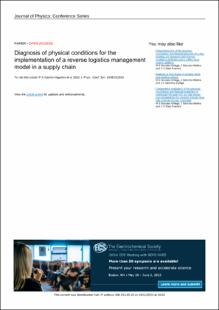Diagnosis of physical conditions for the implementation of a reverse logistics management model in a supply chain
...
GARZÓN AGUDELO, PEDRO | 2021-06-09
The objective of this research was to structure a Reverse Logistics Management
model applied to the furniture sector in the city of San José de Cúcuta, Colombia, based on the
identification and analysis of the current business practices adopted by the companies that are
part of this sector. For this purpose, engineering methods and techniques were used to propose
alternatives that contribute to achieve a competitive growth, a better use of resources and
environmental impact through strategies for the reuse of products or materials that, based on
their physical properties, represent the best feasibility conditions. The type of research used
was descriptive, with a qualitative approach. The methods used for data collection were mainly
surveys, interviews and direct inspection of the companies studied, which made it possible to
evaluate the physical variables of the object of study. It was possible to demonstrate that
furniture manufacturing companies can adopt better reverse logistics practices in the
manufacturing processes through referencing and articulation with strategic allies in the
distribution channels. It was possible to establish the importance of implementing this model as
a strategy to diagnose physical conditions and improve production systems to achieve a more
efficient use of physical manufacturing resources.
LEER










